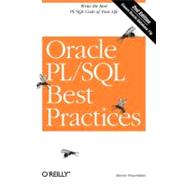
What is included with this book?
Steven Feuerstein is considered one of the world's leading experts on the Oracle PL/SQL language. He is the author or coauthor of Oracle PL/SQL Programming, Oracle PL/SQL Best Practices, Oracle PL/SQL Programming: Guide to Oracle8i Features, Oracle PL/SQL Developer's Workbook, Oracle Built-in Packages, Advanced Oracle PL/SQL Programming with Packages, and several pocket reference books (all from O'Reilly & Associates). Steven is a Senior Technology Advisor with Quest Software, has been developing software since 1980, and worked for Oracle Corporation from 1987 to 1992.
| Preface | p. ix |
| The Big Picture | p. 1 |
| Successful Applications Are Never an Accident | p. 2 |
| Best Practices for Successful Applications | p. 5 |
| Real Developers Follow Standards | p. 37 |
| Best Practices for Developing and Using Standards | p. 38 |
| Life After Compilation | p. 51 |
| Testing, Tracing, and Debugging | p. 52 |
| Best Practices for Testing, Tracing, and Debugging | p. 53 |
| What's Code Without Variables? | p. 73 |
| Best Practices for Declaring Variables and Data Structures | p. 73 |
| Best Practices for Using Variables and Data Structures | p. 81 |
| Best Practices for Declaring and Using Package Variables | p. 88 |
| Developer As Traffic Cop | p. 95 |
| Best Practices for Conditional and Boolean Logic | p. 95 |
| Best Practices for Loop Processing | p. 101 |
| Best Practices for Branching Logic | p. 111 |
| Doing the Right Thing When Stuff Goes Wrong | p. 114 |
| Best Practices for Understanding Error Handling | p. 115 |
| Best Practices for Nitty-Gritty, Everyday Exception Programming | p. 131 |
| Best Practices for Coding Defensively | p. 135 |
| Break Your Addiction to SQL | p. 140 |
| SQL Is Bad! | p. 141 |
| General SQL Best Practices | p. 144 |
| Best Practices for Querying Data from PL/SQL | p. 158 |
| Best Practices for Changing Data from PL/SQL | p. 163 |
| Best Practices for Dynamic SQL | p. 168 |
| Playing with Blocks (of Code) | p. 179 |
| Best Practices for Parameters | p. 180 |
| Best Practices for Procedures and Functions | p. 186 |
| Best Practices for Packages | p. 205 |
| Best Practices for Triggers | p. 211 |
| My Code Runs Faster Than Your Code | p. 218 |
| Best Practices for Finding Slow Code | p. 219 |
| Best Practices for High-Impact Tuning | p. 225 |
| Best Practices for Other Tuning | p. 240 |
| Best Practices Quick Reference | p. 247 |
| Resources for PL/SQL Developers | p. 252 |
| Index | p. 259 |
| Table of Contents provided by Ingram. All Rights Reserved. |
The New copy of this book will include any supplemental materials advertised. Please check the title of the book to determine if it should include any access cards, study guides, lab manuals, CDs, etc.
The Used, Rental and eBook copies of this book are not guaranteed to include any supplemental materials. Typically, only the book itself is included. This is true even if the title states it includes any access cards, study guides, lab manuals, CDs, etc.